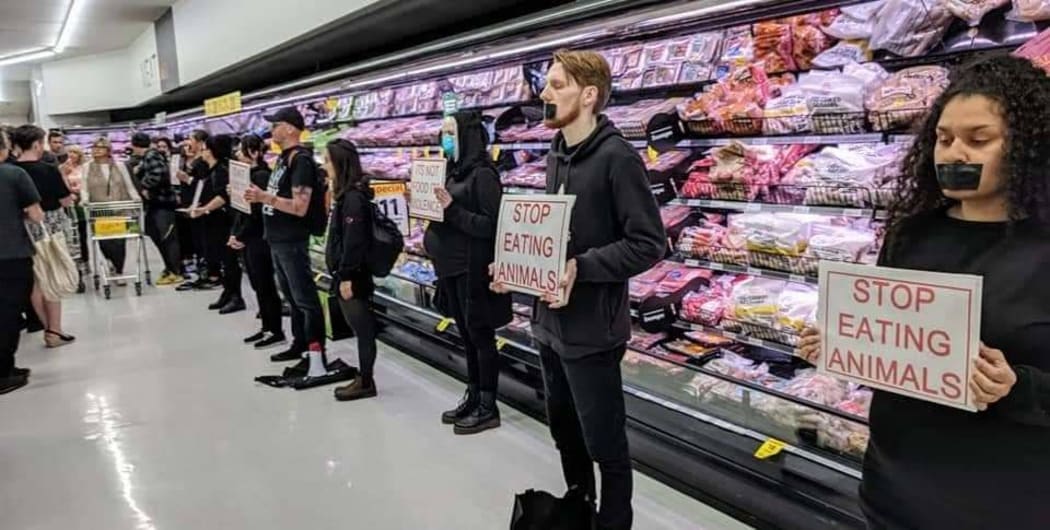Earlier this year, two pro-meat protesters skinned and ate raw squirrels in front of members of the public, including young children, outside a vegan stall at a food market in Soho, London.
Inspired by this event, food writer George Reynolds set out to find out why people hate vegans.
Reynolds tells Jim Mora that at least one of the protestors involved in the squirrel event had affiliations with alt-right politics.

Photo: used with permission
“It was part of a broader tour he was taking in protest against veganism and in favour of eating meat. I seem to remember he wore a shirt saying ‘veganism = malnutrition’ which says a lot about where he was coming from.
“I think the striking thing is that it’s targeted. In the UK we’ve seen an increase in episodes like this, of people deliberately harassing - and in some cases assaulting - vegans which I do think feels like an escalation from hostilities in the past.”
A New Zealand study showed that attitudes towards vegans were significantly less positive than attitudes towards vegetarians. Male participants in the survey expressed much stronger hostile feelings toward vegans than females.
Reynolds says part of the reason for this could be that vegetarianism has been mainstream in the west for a long time, while veganism has exploded in popularity quite recently.
He says a similar survey in the UK revealed that people from conservative backgrounds were much more anti-vegan than those of a liberal persuasion.
“I think it does hold a whole host of anxieties around the role of the man and the fact that meat eating is traditionally aligned with being a ‘real man’.”
Reynolds became aware of the issue around the end of last year when a number of anti-vegan incidents occurred.
The magazine editor for Waitrose resigned after he joked to a writer that instead of writing about plant-based meals, she should write about killing vegans. A customer service representative from a major UK bank said all vegans should be punched in the mouth.
“There was a recent protest where a man actually did punch a vegan in the mouth. It does feel like there’s been more of a recent uptick… then again I’m sure vegans would say they’ve had to put up with discrimination for decades and it’s only now that it’s got into the mainstream that finally some awareness is building.”
Reynolds says part of the backlash is that in recent times the reasons for giving up red meat, or at least reducing or consumption, have become compelling – particularly in the face of climate change. With mainstream businesses and fast-food restaurants now selling plant-based alternatives, meat consumption might appear to be under threat.
“It’s not a position that’s going to age particularly well in 30,40,50 years time. We might look back and not be particularly positive towards it.”
One of the biggest problems with modern meat consumption, Reynolds says, is that it’s priced like a staple but raising an animal in a humane manner is expensive. That means the meat we consume is bad both for animal welfare and the planet. Awareness of this issue has been raised in documentaries such as Cowspiracy which exploded when it was put on Netflix.
“One of the striking things about the debate is that it has been positioned as a zero-sum game, that either the vegans will win or the meat-eaters will win. Truly the best place we could end up is a sort of Goldilocks position in the middle where we’re eating less meat and its better quality.
“But if you look at short-term trends, meat-eating in developing economies like China is going absolutely through the roof so that’s not going to stop anytime soon.”
The perception of veganism has also been tied up with a certain anti-capitalist, animal rights activist lifestyle that has probably put many people off. Reynolds says this is beginning to change with Instagram and Facebook users presenting veganism as something fun and health-focused. Another, perhaps accidental, boon for veganism has been the introduction of the term plant-based.
“It makes it sound sort of fresher and less beige. It feels like less of a commitment as well… you hear the word vegan and you feel like it’s a lifestyle and you’re stuck to it forever. You hear plant-based and that sounds a bit more casual and like something you could pick up while having the occasional burger.”
Reynolds himself tried out veganism himself, even go so far as to try raw veganism which he says was not very fun.
“As a food writer and someone who’s obsessed with food generally, there are certain foods I just enjoy too much. I think I could make it as a vegetarian or a pescatarian pretty easily, but I’m not sure a world without butter or anchovies is one I would want to live in.”

